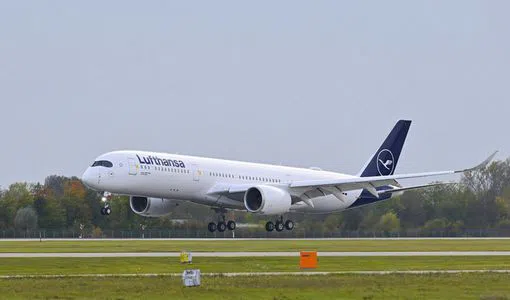A Lufthansa flight en route to Hyderabad was forced to return to Frankfurt following a bomb threat that caused momentary panic among passengers and airport authorities. While initial reports sparked concern, both the airline and airport authorities have now issued official statements clarifying the situation.
Suspicious Threat Forces Mid-Air Return of Lufthansa Flight
In a concerning turn of events, Lufthansa Flight LH752, scheduled to arrive in Hyderabad from Frankfurt, had to turn back midway due to a bomb threat reportedly received shortly after takeoff. The Airbus A340 aircraft was carrying over 250 passengers when the threat was identified.
Upon receiving the alert, Lufthansa adhered to standard international aviation safety protocols and diverted the flight back to Frankfurt. Airport security officials were immediately informed, and precautionary emergency procedures were enacted.
“The safety and security of our passengers and crew is our top priority. The decision to return was precautionary,” Lufthansa said in a statement.
Following the plane’s safe landing in Frankfurt, all passengers were disembarked, and the aircraft underwent a thorough inspection by German security authorities. No explosives or suspicious materials were found onboard, and the threat was later deemed non-credible.

Hyderabad Airport Responds: Flight Rescheduled, No Danger Found
The Rajiv Gandhi International Airport (RGIA), Hyderabad, also issued a statement reassuring the public that no danger was posed to passengers. The airport authority clarified that they had been alerted in advance and were fully prepared to handle any emergency. However, since the aircraft did not reach Indian airspace, there was no operational disruption at RGIA.
Passengers were reportedly accommodated in nearby hotels and provided alternate flight arrangements. Lufthansa offered apologies for the inconvenience caused and committed to refund and rebooking options.
Hyderabad police and cybercrime units were also alerted about the threat’s origin. Initial investigations suggest that the message might have been a hoax, possibly sent via an anonymous email.
“The airline has cooperated fully with authorities, and an investigation is ongoing to trace the source of the threat,” an RGIA spokesperson said.

Investigation Underway as Cybersecurity Agencies Get Involved
While authorities confirmed there was no immediate threat, both Indian and German cybercrime units are working together to trace the origin of the bomb threat. Hoax threats targeting international flights are treated with utmost seriousness, given the implications on passenger safety and aviation operations.
Cybersecurity experts have begun analyzing server logs, IP addresses, and any digital footprints associated with the email that triggered the threat. Early indicators suggest it may have originated from a spoofed IP, possibly routed through anonymizers or VPNs.
This incident comes amid heightened global concerns over aviation security, making any threat, whether real or fake, a serious offense under international aviation laws.
Conclusion: Passenger Safety First, But Hoax Threats Disrupt More Than Flights
The Lufthansa Hyderabad-bound flight incident underscores the importance of stringent aviation safety procedures and cross-border collaboration between nations. While no harm was caused, such threats disrupt not only flight schedules but also instill fear and financial losses.
As investigations continue, authorities urge the public to avoid panic and refrain from spreading misinformation. If you’re planning to travel internationally, always keep emergency contacts updated and cooperate with airline guidelines in unforeseen situations.
Have you ever faced a mid-air flight diversion? Share your experience in the comments. Stay updated with more aviation news by subscribing to The Indian Chronicles newsletter.









